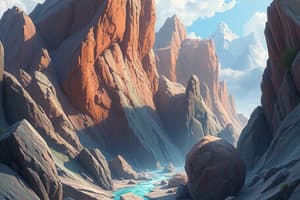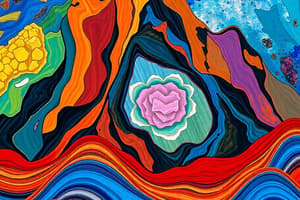Podcast
Questions and Answers
What is the main source of all minerals?
What is the main source of all minerals?
- Ocean currents
- Volcanic ash
- Hot magma in the interior of the earth (correct)
- Rainwater
How many elements make up about 98% of the total crust of the earth?
How many elements make up about 98% of the total crust of the earth?
- Eight elements (correct)
- Twelve elements
- Sixteen elements
- Ten elements
What is the definition of a mineral?
What is the definition of a mineral?
- Man-made substance with an undefined composition and physical properties
- Substance with no arrangement of atoms and no physical properties
- Naturally occurring organic and inorganic substance with an orderly arrangement of atoms and a definite composition and physical properties (correct)
- Synthetic substance with an irregular arrangement of atoms and no definite composition
How many minerals have been found in the earth's crust?
How many minerals have been found in the earth's crust?
What determines the external shape of a mineral?
What determines the external shape of a mineral?
Where do crystals of minerals get formed?
Where do crystals of minerals get formed?
What is the property of breaking along specific planes called?
What is the property of breaking along specific planes called?
What term is used to describe the shining quality of an object?
What term is used to describe the shining quality of an object?
What is the ratio between the weight of a given mineral and the weight of an equal amount of water called?
What is the ratio between the weight of a given mineral and the weight of an equal amount of water called?
Which scale is commonly adopted to express the hardness of minerals?
Which scale is commonly adopted to express the hardness of minerals?
Which type of minerals lack malleability and ductility?
Which type of minerals lack malleability and ductility?
What type of rock is formed out of magma and lava from the interior of the earth?
What type of rock is formed out of magma and lava from the interior of the earth?
What is the process by which sedimentary rocks are formed from deposits through compaction?
What is the process by which sedimentary rocks are formed from deposits through compaction?
Under what action do metamorphic rocks form?
Under what action do metamorphic rocks form?
What is the science that includes the studying of mineral composition, structure, texture, origin, occurrence, alteration, and relationship with other rocks?
What is the science that includes the studying of mineral composition, structure, texture, origin, occurrence, alteration, and relationship with other rocks?
What is the age determination method based on for rocks?
What is the age determination method based on for rocks?
What is the process known as when the materials of the rocks alter chemically and recrystallise?
What is the process known as when the materials of the rocks alter chemically and recrystallise?
Which type of metamorphism occurs when rocks come in contact with hot magma and lava, leading to recrystallisation under high temperatures?
Which type of metamorphism occurs when rocks come in contact with hot magma and lava, leading to recrystallisation under high temperatures?
What is the term used to describe the arrangement in metamorphic rocks where minerals of different nature form alternating arrangements of thin and thick layers which appear in light and dark shades?
What is the term used to describe the arrangement in metamorphic rocks where minerals of different nature form alternating arrangements of thin and thick layers which appear in light and dark shades?
What are some examples of metamorphic rocks?
What are some examples of metamorphic rocks?
In the rock cycle, what are primary rocks from which other rocks, sedimentary and metamorphic form?
In the rock cycle, what are primary rocks from which other rocks, sedimentary and metamorphic form?
What do the crustal rocks - igneous, sedimentary, and metamorphic transform into under the influence of high pressure/temperature?
What do the crustal rocks - igneous, sedimentary, and metamorphic transform into under the influence of high pressure/temperature?
What is the source of sedimentary rocks in the rock cycle?
What is the source of sedimentary rocks in the rock cycle?
What process carries the crustal rocks down into the mantle (interior of the earth) through subduction?
What process carries the crustal rocks down into the mantle (interior of the earth) through subduction?
What is the continuous process through which old rocks are transformed into new ones known as?
What is the continuous process through which old rocks are transformed into new ones known as?
What type of rock can be formed when magma and lava from the interior of the earth cool and solidify?
What type of rock can be formed when magma and lava from the interior of the earth cool and solidify?
Which process is the main source of all minerals?
Which process is the main source of all minerals?
What is the term for the continuous process through which old rocks are transformed into new ones?
What is the term for the continuous process through which old rocks are transformed into new ones?
What determines the external shape of a mineral?
What determines the external shape of a mineral?
How many minerals have been found in the earth's crust?
How many minerals have been found in the earth's crust?
What are some examples of metamorphic rocks?
What are some examples of metamorphic rocks?
What type of metamorphism occurs when rocks come in contact with hot magma and lava, leading to recrystallization under high temperatures?
What type of metamorphism occurs when rocks come in contact with hot magma and lava, leading to recrystallization under high temperatures?
What is the term used to describe the shining quality of an object?
What is the term used to describe the shining quality of an object?
Under what action do metamorphic rocks form?
Under what action do metamorphic rocks form?
How many elements make up about 98% of the total crust of the earth?
How many elements make up about 98% of the total crust of the earth?
What is the science that includes the studying of mineral composition, structure, texture, origin, occurrence, alteration, and relationship with other rocks?
What is the science that includes the studying of mineral composition, structure, texture, origin, occurrence, alteration, and relationship with other rocks?
What type of metamorphism occurs when rocks come in contact with hot magma and lava, leading to recrystallisation under high temperatures?
What type of metamorphism occurs when rocks come in contact with hot magma and lava, leading to recrystallisation under high temperatures?
What is the continuous process through which old rocks are transformed into new ones known as?
What is the continuous process through which old rocks are transformed into new ones known as?
What is the term used to describe the arrangement in metamorphic rocks where minerals of different nature form alternating arrangements of thin and thick layers which appear in light and dark shades?
What is the term used to describe the arrangement in metamorphic rocks where minerals of different nature form alternating arrangements of thin and thick layers which appear in light and dark shades?
What process carries the crustal rocks down into the mantle (interior of the earth) through subduction?
What process carries the crustal rocks down into the mantle (interior of the earth) through subduction?
What is the source of sedimentary rocks in the rock cycle?
What is the source of sedimentary rocks in the rock cycle?
What property of minerals is described as the ability to resist scratching?
What property of minerals is described as the ability to resist scratching?
What determines the external shape of a mineral?
What determines the external shape of a mineral?
What is the ratio between the weight of a given mineral and the weight of an equal amount of water called?
What is the ratio between the weight of a given mineral and the weight of an equal amount of water called?
Which scale is commonly adopted to express the hardness of minerals?
Which scale is commonly adopted to express the hardness of minerals?
What type of minerals are generally obtained from sedimentary rocks and lack malleability and ductility?
What type of minerals are generally obtained from sedimentary rocks and lack malleability and ductility?
Which type of rocks are formed out of magma and lava from the interior of the earth?
Which type of rocks are formed out of magma and lava from the interior of the earth?
What type of metamorphism occurs when rocks come in contact with hot magma and lava, leading to recrystallization under high temperatures?
What type of metamorphism occurs when rocks come in contact with hot magma and lava, leading to recrystallization under high temperatures?
What is the process by which the already consolidated rocks undergo recrystallisation and reorganization of materials within original rocks?
What is the process by which the already consolidated rocks undergo recrystallisation and reorganization of materials within original rocks?
Which type of rocks are formed when cooling and solidification takes place on the surface of the earth?
Which type of rocks are formed when cooling and solidification takes place on the surface of the earth?
What is the science that includes the studying of mineral composition, structure, texture, origin, occurrence, alteration, and relationship with other rocks?
What is the science that includes the studying of mineral composition, structure, texture, origin, occurrence, alteration, and relationship with other rocks?
What term is used to describe the shining quality of an object?
What term is used to describe the shining quality of an object?
What property of minerals refers to breaking along specific planes?
What property of minerals refers to breaking along specific planes?
Flashcards are hidden until you start studying
Study Notes
Minerals and Rocks
- The main source of all minerals is magma and lava from the interior of the earth.
- About 98% of the earth's crust is made up of eight elements: oxygen, silicon, aluminum, iron, calcium, sodium, potassium, and magnesium.
Definition and Formation
- A mineral is a naturally occurring inorganic solid substance with a specific chemical composition and a crystalline structure.
- There are over 4,000 known minerals found in the earth's crust.
- The external shape of a mineral is determined by the internal crystal structure.
- Crystals of minerals form in cavities of rocks or through the cooling and solidification of magma.
Properties of Minerals
- The ability of a mineral to break along specific planes is called cleavage.
- The shining quality of an object is described as luster.
- The ratio between the weight of a given mineral and the weight of an equal amount of water is called specific gravity.
- The hardness of minerals is commonly expressed on the Mohs scale.
- Minerals that lack malleability and ductility are typically obtained from sedimentary rocks.
Rocks
- Igneous rocks are formed from magma and lava from the interior of the earth.
- Sedimentary rocks are formed through the compaction of deposits.
- Metamorphic rocks form under high pressure and temperature conditions, resulting in changes to the mineral composition and structure.
Metamorphism
- Metamorphic rocks can exhibit a layered or banded pattern, known as foliation.
- Contact metamorphism occurs when rocks come into contact with hot magma and lava, leading to recrystallization under high temperatures.
Rock Cycle
- The continuous process through which old rocks are transformed into new ones is known as the rock cycle.
- Primary rocks are the original rocks from which other rocks, sedimentary and metamorphic, form.
- Crustal rocks can transform into metamorphic rocks under high pressure and temperature conditions.
- Sedimentary rocks are formed from the erosion of existing rocks, transportation of sediments, and compaction.
Geological Processes
- The process of subduction carries crustal rocks down into the mantle (interior of the earth).
- The science that includes the studying of mineral composition, structure, texture, origin, occurrence, alteration, and relationship with other rocks is known as petrology.
Studying That Suits You
Use AI to generate personalized quizzes and flashcards to suit your learning preferences.





